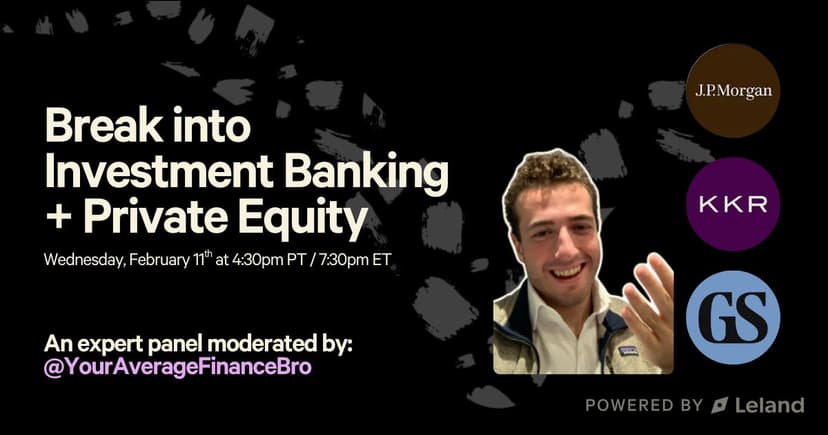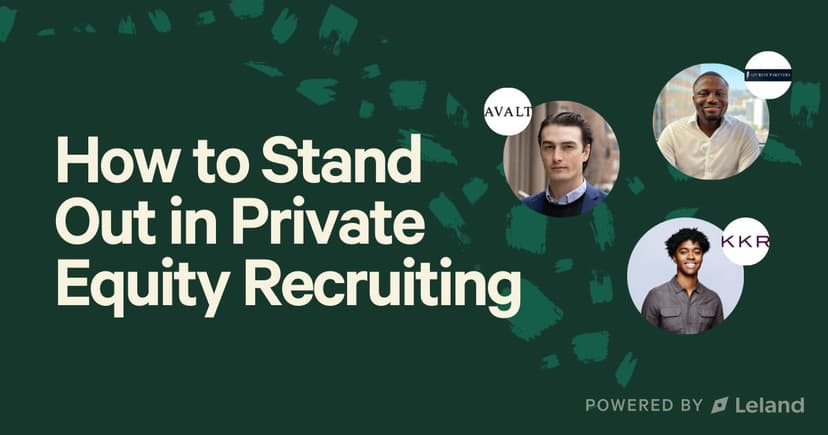What to Know About Private Equity Recruiters & Headhunters
Learn how private equity recruiters and headhunters work, who the top firms are, and how to stand out in a competitive PE hiring process.
Posted August 6, 2025

Join a free event
Learn from top coaches and industry experts in live, interactive sessions you can join for free.
Table of Contents
Private equity is one of the most competitive and lucrative sectors in finance, and breaking into it requires more than just a strong resume and deal experience. Private equity recruiters and headhunters play a central role in identifying and placing top private equity talent at the most elite firms. Whether you're an analyst looking to make the leap from investment banking or an experienced operator exploring roles at private equity portfolio companies, understanding the recruiting process can make or break your chances.
In this guide, we’ll walk through how private equity recruitment works, who the top private equity headhunters are, how executive search firms operate, and tactical strategies to stand out as a candidate.
Read: How to Get Into Private Equity: The Ultimate Guide
How Private Equity Recruiting Works
Private equity recruiting is a fast-paced, highly structured process, especially at the junior level. Most top private equity firms engage specialized private equity recruiters to manage their private equity hiring needs, pre-screen candidates, and conduct initial interviews.
There are two primary types of roles that private equity headhunters focus on:
- Post-banking associate roles, which target investment banking analysts in their first or second year
- Senior operating roles, including leadership positions at private equity portfolio companies, such as CFO, Chief Technology Officer, or Head of Operations
Headhunters work on behalf of private equity funds, not candidates. Their job is to source qualified candidates who meet the specific technical skills, cultural fit, and track record requirements of their private equity clients.
Check out: An Inside View Into the INSANE Private Equity Recruiting Process
What Do Private Equity Recruiters Look For?
Here’s what private equity recruiters and executive search firms prioritize:
- Investment banking experience (or occasionally consulting or hedge funds)
- Strong deal execution and financial modeling experience
- Analytical and technical skills
- Leadership potential and interpersonal polish
- Cultural fit with their private equity firm’s values and portfolio strategy
A deep understanding of value creation, operational improvements, and market dynamics is essential, especially for roles beyond the associate level.
Read: Top Skills You Need to Break Into Private Equity
Who Are the Top Private Equity Headhunters?
There are dozens of firms that specialize in private equity recruitment, but a handful consistently place candidates at top PE firms and private equity-backed companies.
Here are some of the leading private equity recruiters:
| Search Firm | Specialties | Notable Clients |
|---|---|---|
| Amity Search Partners | Early-career PE roles | Upper middle market clients, growth equity |
| Henkel Search Partners | Mega fund and mid-market recruiting | Leading private equity firms |
| Gold Coast Search Partners | Personalized service and senior leadership roles | Private equity-backed companies |
| Odyssey Search Partners | Investment banking to PE transitions | Boutique and large PE firms |
| Dynamics Search Partners | Hedge funds and private equity | Long-term career placements |
| Ratio Advisors | Executive search and PE portfolio companies | CFO, COO, and investor relations roles |
Many of these firms also support executive search for operating partners, leadership positions, and fund finance talent. They act as retained search firms, meaning they are hired exclusively by a client and focus on delivering top executive talent.
Retained vs. Contingent Search Firms
Retained search firms are paid upfront to conduct an exclusive search for a specific role. These are common in the private equity industry, especially for senior and executive roles.
Contingent search firms, on the other hand, only get paid when a candidate is hired. They are more typical for lower-level or volume roles, but less common in PE recruitment.
Top retained firms like Henkel Search Partners and Amity Search Partners are often tasked with finding world-class leaders to drive value creation at portfolio companies.
What to Expect in the Private Equity Recruiting Process
Junior-Level Recruiting (IB Analysts → PE Associates)
The recruiting process for junior private equity roles, typically aimed at investment banking analysts, is highly compressed and competitive. It often begins as early as July of your first year in banking, with top private equity recruiters like Amity Search Partners and Odyssey Search Partners reaching out to pre-vetted candidates. After an initial outreach, you’ll go through a screening call where recruiters assess your communication skills, professionalism, and motivations for joining the private equity industry. If you pass this stage, expect a technical assessment, usually a paper LBO or modeling case, to evaluate your core financial skills. This is followed by two to three rounds of interviews with the private equity firm itself, where you’ll be tested on your deal experience, investment judgment, and cultural fit. Timing is tight as many firms issue exploding offers within 24–48 hours. Being well-prepared and decisive is essential.
Read: Analyst vs. Associate: Role, Responsibilities, & Salary
Senior-Level Recruiting (Portfolio Leadership & Executive Roles)
For senior professionals, especially those targeting leadership roles at private equity portfolio companies or joining as operating partners, the process is more customized and relationship-driven. Executive search firms like Gold Coast Search Partners or Ratio Advisors often lead these retained searches, focusing on candidates with proven experience in value creation, operational improvements, and scaling businesses. The interview process includes multiple conversations with recruiters and PE partners, detailed reference checks, and sometimes case studies or strategic planning exercises. Firms are evaluating not only your ability to lead but also your alignment with the fund’s investment strategy and company culture. These processes take longer but are highly targeted, with a focus on finding exceptional talent who can drive measurable impact across portfolio companies.
Which Firms Use Recruiters the Most?
| Firm Type / Use Case | Why They Use Recruiters | Examples of Recruiters or Roles Filled |
|---|---|---|
| Mega Funds (e.g., Blackstone, KKR, Carlyle, TPG) | High-volume associate hiring, elite candidate filtering, confidentiality | Henkel Search Partners, Amity Search Partners, Investment Associates |
| Upper Middle Market & Growth Equity Funds | Specialized searches for sector-focused or growth-oriented roles | Retained search firms for healthcare, tech, and industrials; Growth equity professionals |
| Venture Capital & Niche PE Funds | Need for operating talent with startup or scaling experience | Executive recruiters for CTO, product leadership, or go-to-market roles |
| Private Equity Portfolio Companies | Filling C-suite and strategy roles that drive portfolio value creation | CFO, COO, CTO placements; operational improvement, cost reduction, and portfolio management roles |
| New Fund Builds & Spinouts | Rapid scaling and need for culturally aligned talent in early-stage PE firms | Search firms sourcing founding team members and top private equity talent |
| Cross-Border or Global Funds | Geographic specialization and market access | Search partners with deep understanding of international hiring needs and cultural fit |
Do’s and Don’ts of Working With a Private Equity Headhunter
Do:
- Respond quickly and professionally. Recruiters move fast—especially in on-cycle recruiting. A delayed response can signal disinterest or cost you a time-sensitive opportunity.
- Come prepared. Your resume, deal sheet, and LinkedIn profile should be sharp, accurate, and up to date. If you’ve closed deals, quantify impact. If you’ve led initiatives, highlight outcomes.
- Know your story and your goals. Be clear about what you’re looking for: fund size, sector focus, geography, and culture. Recruiters can’t match you effectively without that context.
- Be honest about your process. If you're interviewing elsewhere or on a tight timeline, say so. Transparency builds trust and helps recruiters advocate for you strategically.
Don’t:
- Ghost or flake. Last-minute cancellations or no-shows damage your reputation quickly. PE is a small world—word travels.
- Overstate your experience. Recruiters and firms will dig into your deal sheet. If something doesn’t hold up, it’s a red flag you won’t recover from.
- Assume they work for you. Headhunters serve the client—the private equity firm—not the candidate. Your job is to make it easy for them to want to present you.
Building trust with a leading private equity recruiter isn’t about schmoozing; it’s about consistency, clarity, and execution. Treat them like a strategic partner, and they’ll return the favor when it matters most.
Beyond Associates: Executive Search in PE
Private equity executive search goes far beyond placing investment professionals. For roles that drive transformation at the portfolio level or steer fund-level strategy, PE firms rely heavily on retained search partners with deep sector and operational expertise.
These searches are strategic bets on individuals who will unlock value across the lifecycle of a portfolio investment. Here are the types of roles executive search firms typically fill:
- Operating Partners – These are former operators or consultants with a track record of value creation across functions like supply chain, pricing, digital transformation, or GTM execution. They act as force multipliers across the portfolio.
- CFOs and Financial Leadership – For portfolio companies, the CFO is often the first critical hire. Recruiters look for financial leaders who understand debt covenants, PE-backed reporting, fund finance, and cost discipline.
- Growth-Stage or Transformational CEOs – Whether a company is scaling aggressively or undergoing a turnaround, PE firms seek CEOs who can lead with urgency, align teams, and drive results—not just vision.
- Investor Relations and Capital Markets Executives – At the fund level, PE firms are increasingly hiring IR professionals who can manage LP communications, fundraising, and secondaries strategy.
Firms like Ratio Advisors and Gold Coast Search Partners are trusted by funds to run these highly specialized searches. They bring a nuanced understanding of private markets, including how to assess leadership styles, cultural fit, and the ability to execute a fund’s value creation plan. These are not off-the-shelf hires; they’re tailored, long-game placements aimed at generating outsized returns.
How to Stand Out to Recruiters & Headhunters
Make Your Value Creation Impossible to Miss
In private equity recruiting, it’s not enough to say you worked on a deal; you need to prove you drove the outcome. Recruiters are looking for candidates who played a pivotal role in increasing revenue, expanding margins, or identifying operational levers during diligence. Did you build the customer segmentation that led to a 20% pricing lift? Did your cost analysis uncover $5M in post-acquisition savings? Frame your impact in commercial terms that resonate with how private equity firms think about value creation. This is how you stand out from the sea of “deal team” résumés.
Show That You “Get” the Culture
Private equity firms care just as much about how you operate as what you know. Can you thrive in a lean, non-hierarchical team? Are you someone who gets stuff done without ego? Recruiters want to see self-awareness, adaptability, and alignment with the firm's pace and values. For portfolio company roles, cultural fit is even more critical as you’ll be interfacing with founders, board members, and front-line teams. Understanding what kind of leadership style works in PE-backed environments (and where you fit in that spectrum) makes it easier for recruiters to confidently advocate for you.
Prove You’ve Got Real Leadership Chops
Private equity is a long game. Firms aren’t just hiring you for the next two years; they’re evaluating your leadership runway. Recruiters want evidence that you’ve been trusted with real responsibility early on. That could mean managing junior private equity team members, leading a diligence workstream, or owning the financial model on a live deal. If you’ve worked with operating partners or presented directly to investment committees, that’s gold, so highlight it. Show that you lead, influence, and drive outcomes under pressure.
Let the Numbers Do the Talking
Recruiters love candidates who speak in metrics. It signals rigor, credibility, and clarity of thought. Did your market sizing unlock a $200M TAM? Did you redesign a KPI dashboard that improved reporting across 10 portfolio companies? Even if you're not sure how impressive something sounds, frame it with data and context. Use metrics to anchor your narrative, as it makes it easier for recruiters to assess you quickly and pitch your strengths to clients. Vague statements are forgettable. Specifics close the loop.
Your Reputation Speaks Louder Than You Think
Private equity is a tightly networked world, and your reputation often precedes your resume. Search firms take references seriously and not just at the final stage. Informal backchannel feedback can determine whether you get introduced to a top fund. Build strong relationships with people who will advocate for you: VPs, Principals, Partners, or even respected portfolio execs. Treat every role as a long-term investment in your personal brand. If you consistently deliver, that track record becomes your best marketing and makes recruiters far more willing to go to bat for you.
Expert tip: Top private equity coaches can help you refine your story, prep for recruiter screens, and position yourself for top-tier firms. With expert guidance, you’ll stand out not just on paper, but in every conversation that follows.
Common Misconceptions About PE Recruitment
- “Recruiters will find me a job.” Recruiters don’t work for candidates; they work for private equity firms. Their job is to fill roles with very specific criteria, not to help you explore your options. If you don’t match what their client is looking for, they’ll move on quickly. Think of them as gatekeepers, not career coaches.
- “All recruiters are basically the same.” Far from it. Some headhunters specialize in on-cycle associate placements at mega funds, while others focus exclusively on off-cycle roles, operating partners, or portfolio company leadership. A recruiter who knows Bain Capital well might have zero insight into lower middle market funds or growth equity.
- “If a recruiter isn’t reaching out, I’m not qualified.” Not necessarily. Many qualified candidates never get inbound outreach, especially if they’re at non-bulge bracket banks or less visible funds. If you're not hearing from recruiters, it could just be a visibility issue—reach out proactively and get on their radar.
- “Working with one recruiter covers all my bases.” No single recruiter has access to every role or fund. Most firms partner with a handful of search partners—some exclusive, some not. You’ll need to strategically engage multiple recruiters to maximize exposure without overextending yourself.
- “Recruiters only care about deal experience.” While deal work is critical, headhunters also assess polish, communication skills, leadership potential, and cultural fit. Especially for portfolio company roles, your ability to work with management teams, drive results, and lead through ambiguity matters just as much as your transaction history.
How Headhunters Drive the On-Cycle Process (And Why It Feels So Aggressive)
In on-cycle recruiting, headhunters run the show. They control the flow of candidates, initiate the process, and act as the first gatekeepers between you and the firms. It typically begins with a mass outreach email—often at night, always without warning. Within 24–48 hours, you're submitting your resume, filling out a detailed data sheet, and getting slotted into intro calls that serve as unofficial first-round interviews.
Their job is to filter aggressively. They’re listening for polish, confidence, and tight communication. If you stumble through a deal explanation or can’t clearly articulate your fund preferences, you’ll quietly move to the bottom of the stack. Even a Harvard grad with GS TMT on their resume won’t get prioritized if they can’t deliver in those first 15 minutes.
Once the process begins, headhunters coordinate interview schedules, communicate feedback, and often shape where you land. If they see you as a better fit for an upper-middle-market industrials fund than a mega-cap consumer platform, they’ll steer you that way. If you perform well, they’ll push you to their top clients. If not, you’ll stop hearing from them.
Read: On-Cycle, Off-Cycle, vs. Full-Cycle Recruiting
What Headhunters Actually Evaluate in First Meetings
Recruiters aren’t just checking boxes—they’re making judgment calls. In your first meeting, they’re assessing whether you can hold your own in front of a Partner. That means:
- Can you walk through your resume without rambling?
- Can you explain a deal in both 30 seconds and 5 minutes—with clarity, context, and confidence?
- Can you speak intelligently about fund types, sectors, and why you’re pursuing private equity?
- Can you do all this without sounding like you’re reading off a script?
"Polish" in recruiter-speak isn’t just about how you dress or speak—it’s about executive presence. They want someone they can put in front of a Blackstone VP without flinching. If you don’t demonstrate that level of presence, even a perfect resume won’t save you.
And yes, they know when you’re bluffing. Most headhunters were former bankers or investors themselves. They’ve heard hundreds of deal walkthroughs and will catch even subtle signs that you’re inflating your role or avoiding details. Authenticity, precision, and fluency matter.
Why Headhunters Push You to Take the First Offer (And Whether You Should)
Once you’ve made it through interviews and received an offer, your headhunter will push—hard—for you to accept it. From their perspective, this is about closing the loop. Every day you wait puts their commission at risk, especially in a market where reneging and offer drops happen regularly.
Here’s the uncomfortable truth: most of the time, they’re not wrong. In on-cycle, the window is brutally short. Turning down an offer without another one in hand is almost always a mistake. You can try to leverage your offer for interviews elsewhere, but that clock is ticking—and most firms won’t scramble to squeeze you in just because you’re exploring options.
Still, that doesn’t mean you shouldn’t think critically. If a fund feels like a terrible fit, talk to your coach or mentor before accepting. Just be strategic about how you manage that decision—because in the eyes of recruiters, indecision equals risk.
Final Thoughts: Navigating Private Equity Recruitment Like a Pro
Whether you're a banker targeting associate roles, a seasoned executive eyeing your next leadership opportunity, or a candidate transitioning from hedge funds, working with top private equity recruiters can fast-track your career.
From search partners like Amity and Odyssey to retained executive search firms like Henkel, the right advisor understands the nuances of PE recruitment, from assessing qualified candidates to aligning them with the right talent needs of clients.
Treat recruiters as strategic partners, not just intermediaries. Build relationships early, be clear about your goals, and prove you’re ready to deliver value.
Want to Break Into Private Equity or Level Up Your Career?
Navigating private equity recruiting without guidance can cost you opportunities—and time. Executive search firms and private equity headhunters are the gatekeepers to the most competitive roles in the industry, from on-cycle associate positions to C-suite portfolio company placements. But knowing how and when to engage with them? That’s where a great coach makes all the difference.
Whether you’re prepping for headhunter screens, refining your deal sheet, or mapping out a pivot into the private markets, a PE coach can help you craft a strategy that gets results. Don’t leave your next move to chance—work with someone who’s helped candidates land offers at top funds and portfolio companies.
Explore top private equity coaches here and book a free intro call to get started. Also, check out our Private Equity Bootcamps and Free Events to fully unlock your PE potential!
See: The 10 Best Private Equity Career Coaches for Interview Prep & Training
Read these next:
- A Guide to Private Equity Valuation: How It Works
- Finance Internships for Freshmen in College
- The Different Types of Buy-Side Firms–and How to Choose One
- An Expert’s Guide to Resumes: Five Tips to Make You Stand Out
- The Best Venture Capital & Private Equity Newsletters and Podcasts
- Why an MBA is the Best Time to Start a Business
FAQs
What’s the difference between private equity recruiters and executive search firms?
- Executive search firms tend to focus on senior and leadership roles, while private equity recruiters often specialize in junior and associate placements. Some firms do both.
How do I get in touch with a top private equity recruiter?
- Reach out via email or LinkedIn. If you’re in investment banking or consulting, they may reach out to you first. Be prepared with your resume, deal sheet, and clear preferences.
Are all private equity headhunters the same?
- No. Some specialize in private equity-backed companies, others in mega funds or niche strategies like growth equity or venture capital.
What are portfolio companies?
- These are companies owned by private equity firms. Recruiters often help fill roles at these companies—especially for CFOs, COOs, or growth-stage operators.
Is private equity recruiting only for investment bankers?
- Mostly at the junior level, yes. But for operating partners or C-suite roles, recruiters work with people from diverse backgrounds, including industry operators and consultants.
Browse hundreds of expert coaches
Leland coaches have helped thousands of people achieve their goals. A dedicated mentor can make all the difference.




















